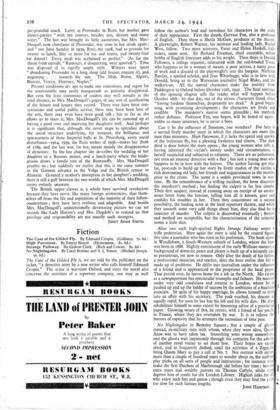Fiction
The Case of the•GlIded Fly. By Edmund Crispin. (Gollancz. 7s. 6d.) High Pavement. By Emery Bonett. (Heinemann. 8s. 6d.)
Strange Pathway. By Gideon Clark. (Rich and Cowan. 8s. 6d.)
No Nightingales. By Caryl Brahms and S. J. Simon. (Michael Joseph. gs. 6d.)
The Case of the Gilded Fly is, we are told by the publisher on the jacket, " a detective story by a new writer who calls himself Edmund Crispin." The scene is war-time Oxford, and since the novel also concerns the activities of a repertory company, one may as well
follow the author's lead and introduce his characters in the order of their appearance. First the sleuth, Gervase Fen, also a professor of English. Then there is Sheila McGaw, producer at the theatre. A playwright, Robert Warner, his mistress and leading lady, Rachel West, follow. Two more actresses, Yseut and Helen Haskell, half- sisters, come next. Sir Richard Freeman, chief constables whose hobby of English literature adds to his weight. Then there is Donald Fellowes, a college organist, infatuated with the red-headed Yseut, who happens to be a woman of means, a poor actress, a nasty piece of work and a discard of the playwright's into the bargain. Nicholas Barclay, a spoiled scholar, and Jean Whitelegge, who is in love with Donald, bring us to the Watsonian journalist Nigel Blake, and the walkers-on. All the named • characters make the journey from Paddington to Oxford before October i2th, 1940. The final sentence of the opening chapter tells the reader what will happen before October 18th : by that day, out of the eleven characters listed, three " having fordone themselves, desperately are dead." A good begin- ning, with promising development ; the characters are lively and credible. The murderer's motive seems plausible ; his methods rather dubious. Professor Fen, one hopes, will be heard of again: unlike so many amateurs, he is never a bore.
Can it be the influence of Simenon, one wonders? For here is a second lively murder story in which the characters are more like men than monsters. High Pavement, if .it lacks the speed and sparkle of the lecherous fly, has a pleasing freshness and charm. The dark deed is done before the story opens ; the young woman who tells it, having inherited the victim's money under odd circumstances, is herself suspected and subjected to calumny. There are no policemen, not even an amateur detective with a flair ; but just a young man who happens to be in love with the heiress. The author having got thus far, proceeds to build up her story by lively studies of the victim, a rich dominating old lady, her friends and acquaintances in the months prior to the crime. The scene is a sedaie provincial town in war- time. By the remembrance of a trifling incident, the lover discovers the murderer's 'method • but finding the culprit is far less simple. Their first suspect, instead of running away on receipt of an anony- mous letter from the heroine, telling him all is known, goes and confides his troubles in her. Then they concentrate on a second possibility, the leading actor at the local repertory theatre, and while they unearth some very odd things about him, they also find he is innocent of murder. The culprit is discovered eventually ; motive and method are acceptable, but the characterisation of the criminal seems a little thin.
'After two such high-spirited flights Strange Pathway seems a trifle pedestrian. Here again the story is told by the central figure, this time a journalist who has risen in his profession. The book opens in Wandleham, a South-Western suburb of London, where the hero was born in 1888. Slightly reminiscent of the early Wellsian manner, a background of domestic peace and plenty is built up of a leisurely age, so prosperous' yet now so remote. Only after the death of his father, a professional musician and teacher, does the hero realise that life is made up of problems. He drifts into journalism under the influence of a friend and is apprenticed to the proprietor of the local paper. That period over, he leaves home for a job in the North. His career as a newspaperman has spectacular triumphs and failures. He marries under very- odd conditions and returns to London, where he is pushed up and up the ladder of success by the ambitions of a business associate. In spite of his happy marriage, he allows himself to drift into an affair with his secretary. The peak reached, his descent is equally rapid, for soon he has lost his job and his wife dies. He does rehabilitate himself to some extent by becoming editor of a provincial paper. Growing weary of this, he retires, with a friend of his youth, to France, where they are overtaken. war. It is to relieve die horrors of captivity that he attempts the recreation of time past.
No Nightingales in Berkeley Square ; but a couple of ghosts instead, ex-military men with whom, when they were alive, Queen Anne was to have taken tea. Something went wrong somewhere, and the ghosts wait impatiently through the centuries for the advent of another royal visitor to set them free. Their hopes are raised often, and as frequently dashed, until the activities of a Zeppelin bring Queen Mary to pay a call at No. 7. Not content with rather more than a couple of hundred years to wander about in, the authors play tricks on all sorts of people and institutions ; for instance they make the first Duchess of Marborough old before her time ; bestow extra years and wealthy parents on Thomas Carlyle while they deprive him of credit for the London Library. Highish jinks for all who enjoy such fun and games ' - though even they may find the pace too slow for such furious lengths.
Joint Haaipscet.


























 Previous page
Previous page